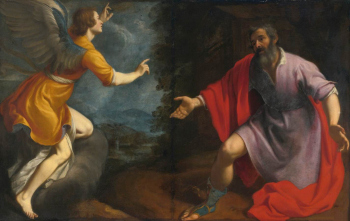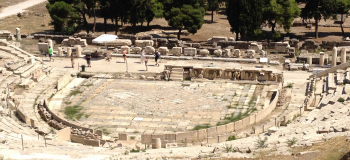Caesar
Acts 17:7, 25:8, 10 - 12, 21, 25,
26:32, 27:1, 24, 28:19, Philippians 4:22
Please see our listing for Augustus Caesar.
Caiaphas
Matthew 26:3, 26:57, Luke 3:2
John 11:49, 18:13 - 14, 24, 28, Acts 4:6
Caiaphas, a Sadducee, was the Roman-appointed High Priest from 18 to 36 A.D. He was the son-in-law of a former high priest named Annas (6 - 15 A.D.). He held the title of High Priest longer than anyone else in New Testament times did.
Caiaphas hated Jesus and plotted with other priests and elders to have him killed "by trickery" (Matthew 26:5). Christ appeared before him, after his arrest, so that he could 'officially' be condemned to death (see Mark 14, Luke 22). Later, after the resurrection, the apostles appeared before Caiaphas to answer for their behavior and teachings (Acts 4).
Candace, likely a title rather than a personal name, was the Queen of Ethiopia in 32 A.D. She allowed her chamberlain, a eunuch, to journey to Jerusalem's temple for the purpose of worship. God, during the eunuch's travel back home, sent Philip the Evangelist to him. Philip's purpose was to explain the Biblical verses related to the Messiah and baptize the eunuch.
Paul requested something special from Timothy just before his martyrdom. He asked, "When you come, bring the chest that I left in Troas with Carpus, and the books - especially the parchments" (2Timothy 4:13). Carpus, a Christian of integrity, was entrusted to protect the apostle's enduring gift to the church - his writings. He played a little known but critical role in the canonization of the New Testament!
"Paul also wanted Timothy to bring several important items needed to complete the canonization of his Epistles . . . We can deduce that this chest contained Paul's own writings - as well as extra sheets of parchment or animal skins that had been made into blank pages for writing.
"Once Timothy and Mark arrived with these items, Paul could then add the final inspired additions to his Epistles" (Holy Bible, Faithful Version, second edition, chapter 9).
His completed writings, as well as the work of other inspired authors, would ultimately find their way to the apostle John. Near the end of the first century A.D., as the last of the original twelve disciples still living, he would compile and complete what we call the New Testament.
Please see our listing for the Apostle Peter.
Chloe was a woman whose household informed Paul about the divisions and arguments taking place in the Corinthian church. It is unclear whether Chloe lived in Corinth or Ephesus.
Claudia was a female Christian who is mentioned sending her greetings to Timothy through Paul. It is speculated that she may have been the wife of Pudens. Nothing more is known about her.
Claudius Caesar
Acts 11:28, 18:2
Claudius Caesar was the fourth Emperor over the Roman Empire (the first three being Augustus, Tiberius and Caligula), reigning from 41 to 54 A.D.
Claudius, soon after becoming Emperor, issued an edict re-establishing the rights of Jews to keep their "ancient customs" without being hindered (Antiquities of the Jews, Book 19, Chapter 5, Sections 2 - 3). This right, asserted by Augustus and Tiberius, had been rejected by Caligula, who went so far as to have a statue of himself placed in Jerusalem's temple!
Although Jews, under the Emperor, were granted the right to practice their beliefs, their numbers got so great in Rome that they were forbidden to assemble. Evidence suggests that the regular disturbances caused by the Jews in the city led to the edict banishing them (and Christians) from the capital. Over time, however, the Jews and Christians returned to the city.
Clement was considered a coworker in the gospel by the Apostle Paul and specifically mentioned as having his name written in the Book of Life. Origen, a third century A.D. Catholic theologian, believed this Clement became the Catholic Church's fourth Pope.
Cleopas was one of two men traveling to Emmaus on the Sunday after Jesus' resurrection from the dead. Jesus miraculously appears to them on the road and explains why it was necessary the Messiah had to suffer and die (Luke 24:25 - 27). It is only after the Lord sits down with them to eat a meal that he opens their minds and they comprehend what he was saying.

Cornelius, a Roman centurion who lived in Caesarea, was a godly and generous man who helped the poor and often prayed.
God, because of his character and prayers, selected Cornelius, in 38 A.D., to be the first recorded gentile (non-Jewish) to become a Christian. This act was accomplished by sending Peter, one of the most bigoted individuals in the church at the time, to him. This miraculous event showed that God was no respecter of persons and that he fully intended all people to repent and believe the gospel!
Crescens, a Christian, is mentioned by Paul as having journeyed to the Roman province of Galatia. This trip took place only a short time before the apostle's martyrdom in Rome. Some have speculated, without evidence, that he was one of seventy people Jesus personally trained (Luke 10).
Crispus
Acts 18:8, 1Corinthians 1:14
Crispus was an educated Jewish man of high character who was the leader (ruler) of Corinth's synagogue. He, along with his household, became Christians during Paul's roughly 18-month stay in the city. Crispus and Gaius were the only two people in Corinth personally baptized by the apostle.
Damaris' name means "little woman" or "heifer." She is one of only two people listed as having converted to Christianity during Paul's brief evangelism of Athens. Luke may have recorded her name due to her being an important or noteworthy person. The apostle's stirring message to the Athenians, given from the Areopagus (Acts 17:19), can be found in Acts 17:22 - 31.
Demas
Colossians 4:14, Philemon 1:24
2Timothy 4:10
Paul initially considered Demas a fellow laborer in the gospel. He was with the apostle during his first imprisonment in Rome that took place at the end of his fourth missionary journey. A few years later, however, in his last letter to Timothy, Paul laments that Demas forsook him to pursue what the world had to offer.
Demetrius
Acts 19:24, 38, 3John 1:12
The first Demetrius was a wealthy and important Ephesian silversmith who made his fortune by promoting idolatry. He, and his fellow craftsmen, made small shrines, idols and alike themed around the pagan goddess Diana (Artemis). Ephesus' huge idolatrous temple is today considered one of the seven wonders of the ancient world.
Demetrius, fearing the gospel would continue to effect, negatively, his business, stirred up the pagans in Ephesus to oppose the apostle. Although the tumult he caused was quieted by a city official, it hastened Paul's exit of the city.

The second Demetrius of the Bible was mentioned by the Apostle John in 3John 1:12.
Please see our listing for Thomas.
Dionysius (the Areopagite)
Acts 17:34
Dionysius is one of only two people specifically named as having converted to Christianity during Paul's brief evangelism of Athens. Dionysius was likely a prominent citizen of Athens and a member of the Areopagus, the Athenian Supreme Court.
Diotrephes, who may have been an early church leader, was rebuked by the Apostle John in the last of his three letters. John noted that the prideful Diotrephes rejected not only his writings but also his authority as an apostle.
This authoritarian and controversial leader slandered Christians and refused to show basic hospitality to other believers. He also exercised the bold step of forbidding anyone from attending the fellowship he was in who practiced hospitality toward fellow brethren.
Scripture does not record whether John carried out his planned visit to correct Diotrephes or not (3John 1:10).
Dorcas (Tabitha)
Acts 9:36 - 42
Dorcas was a generous first century Christian woman who dwelled in Joppa. She was known not only for financially helping the poor but also for making them clothes (Acts 9:39). After a seemingly short illness she died.
Christians in Joppa send for the Apostle Peter who was in Lydda. When he arrives, he prays for Dorcas who is then raised from the dead!
Dorcas is only the eighth of ten people Scripture records as being resurrected from the dead (not including Christ). She is also the only person Peter is known to have brought back to life.
Drusilla was the great-granddaughter of Herod the Great and daughter of Herod Agrippa I. She converted to Judaism at a young age and married Roman governor Felix when she was around 16. Drusilla heard Paul preach the gospel during the summer of 58 A.D. while he was in state custody in Caesarea.
Josephus, in his Antiquities of the Jews (Book 20, Chapter 7, Section 2), notes that Drusilla's son Marcus Agrippa, and his wife, were killed when Mount Vesuvius erupted in 79 A.D.